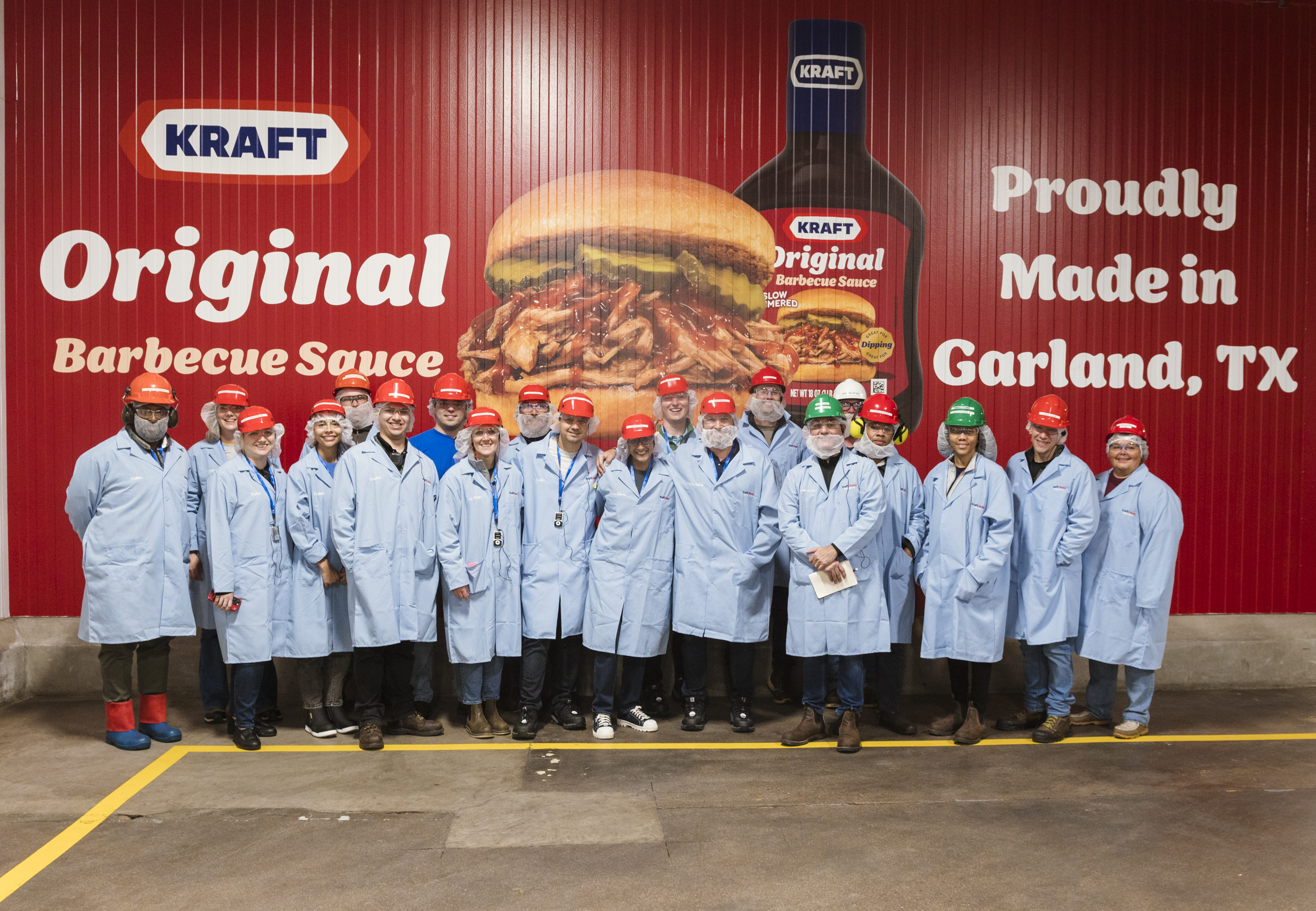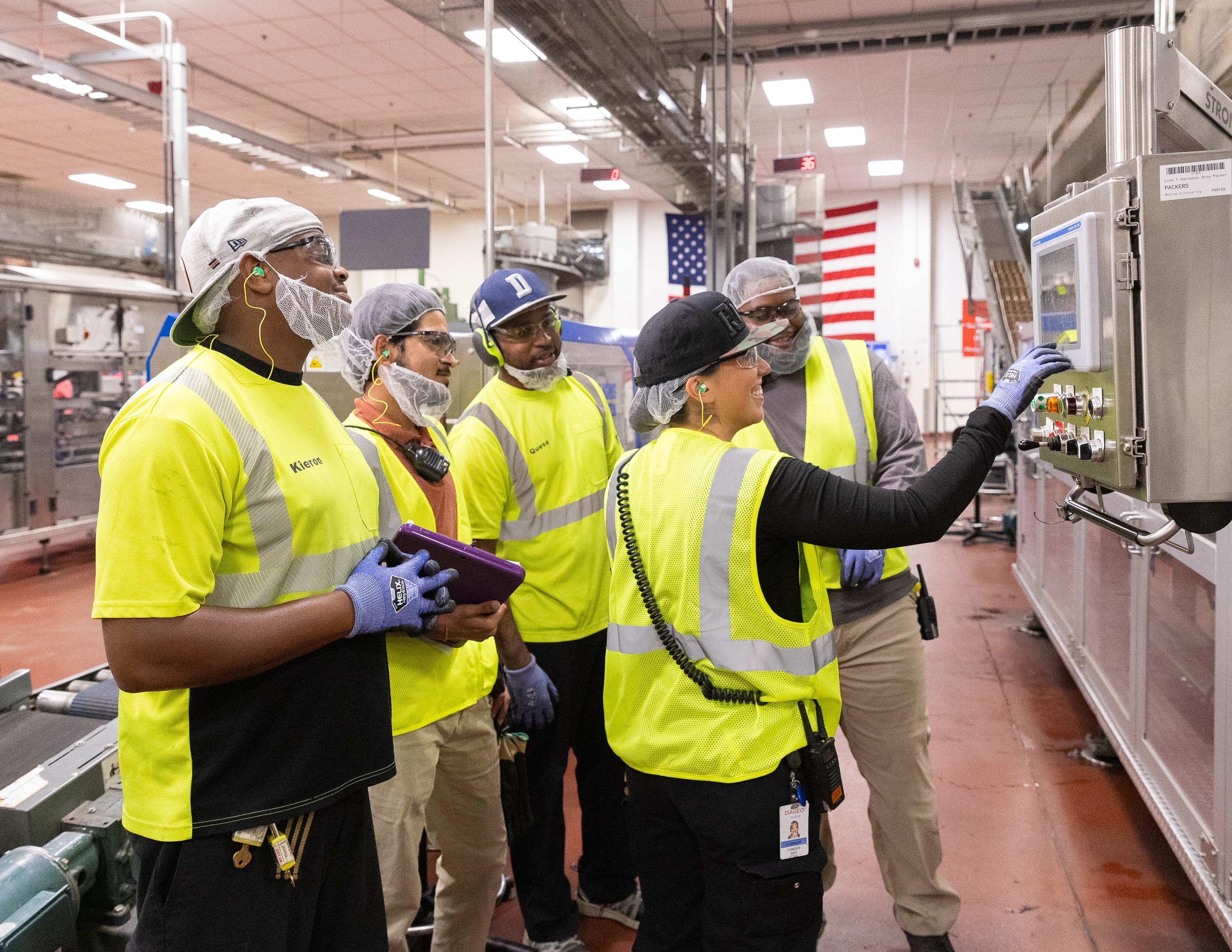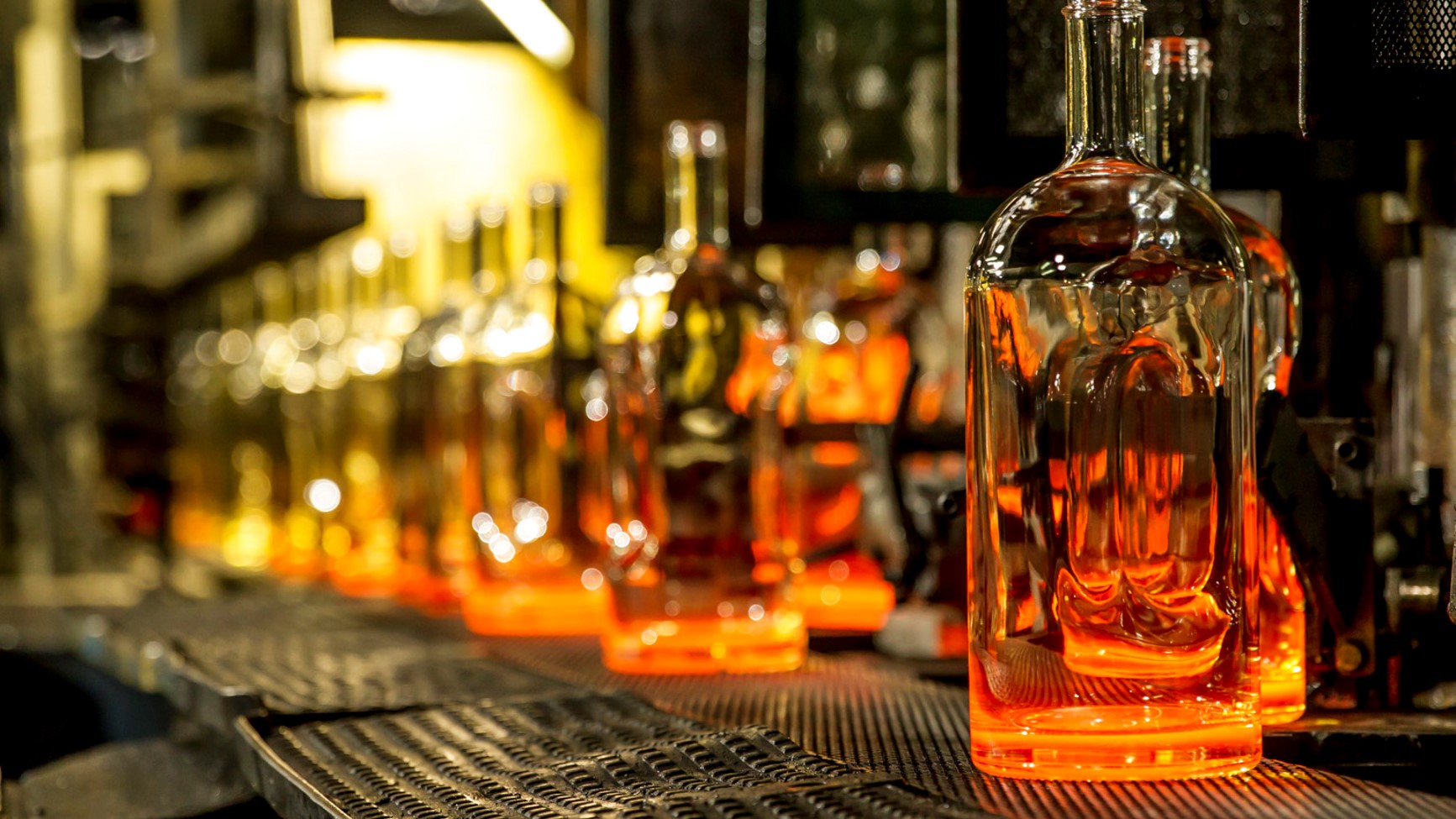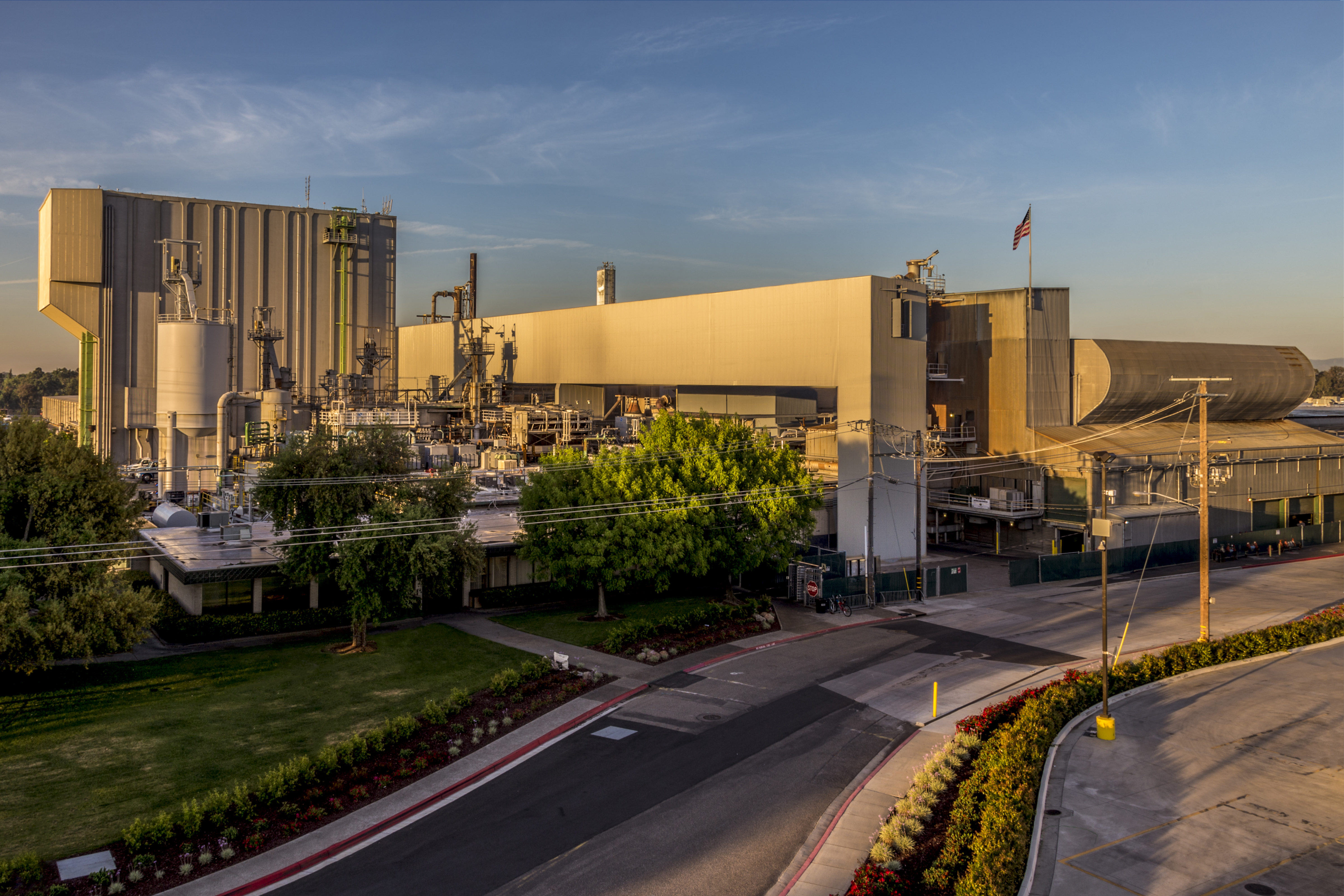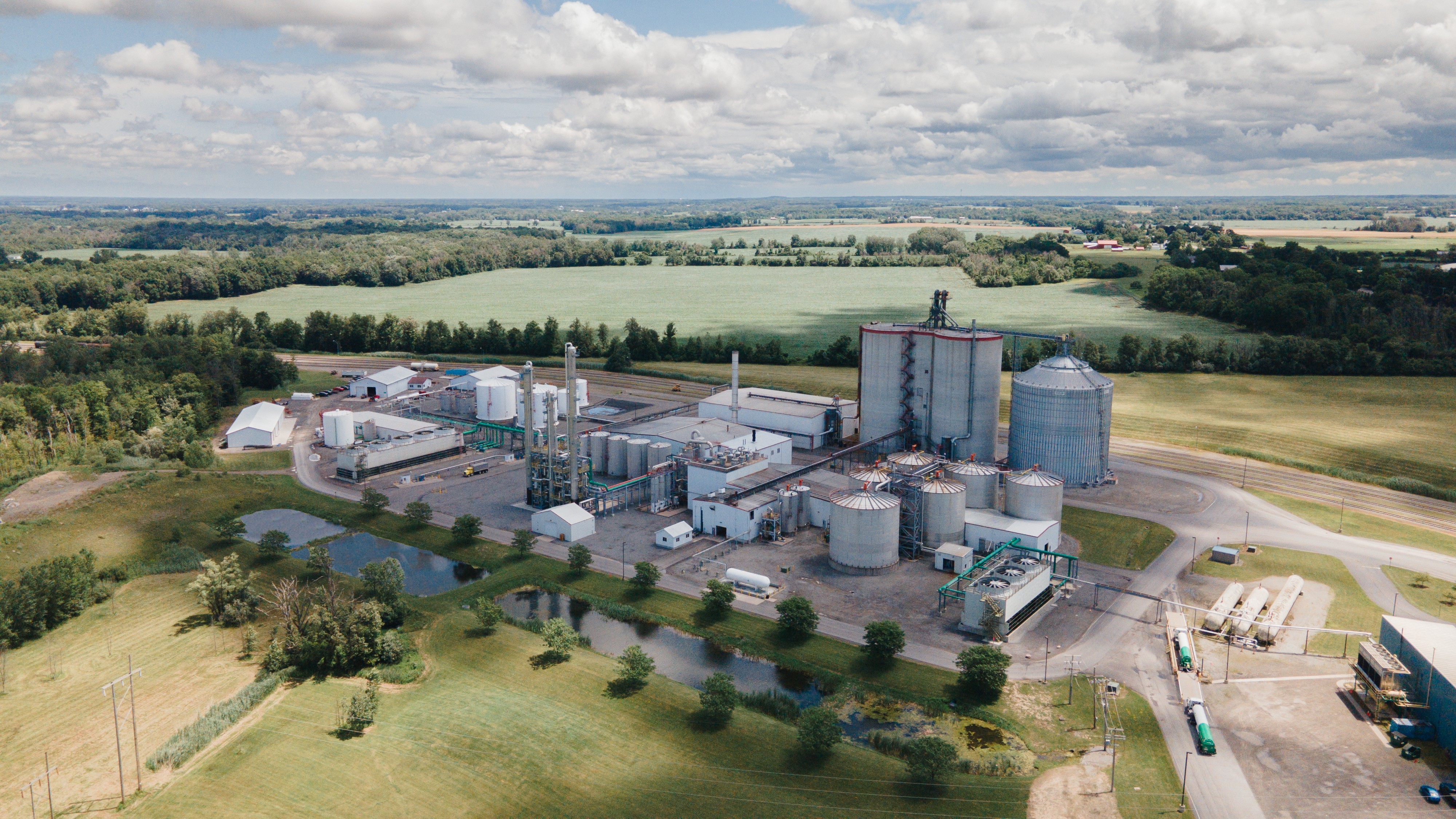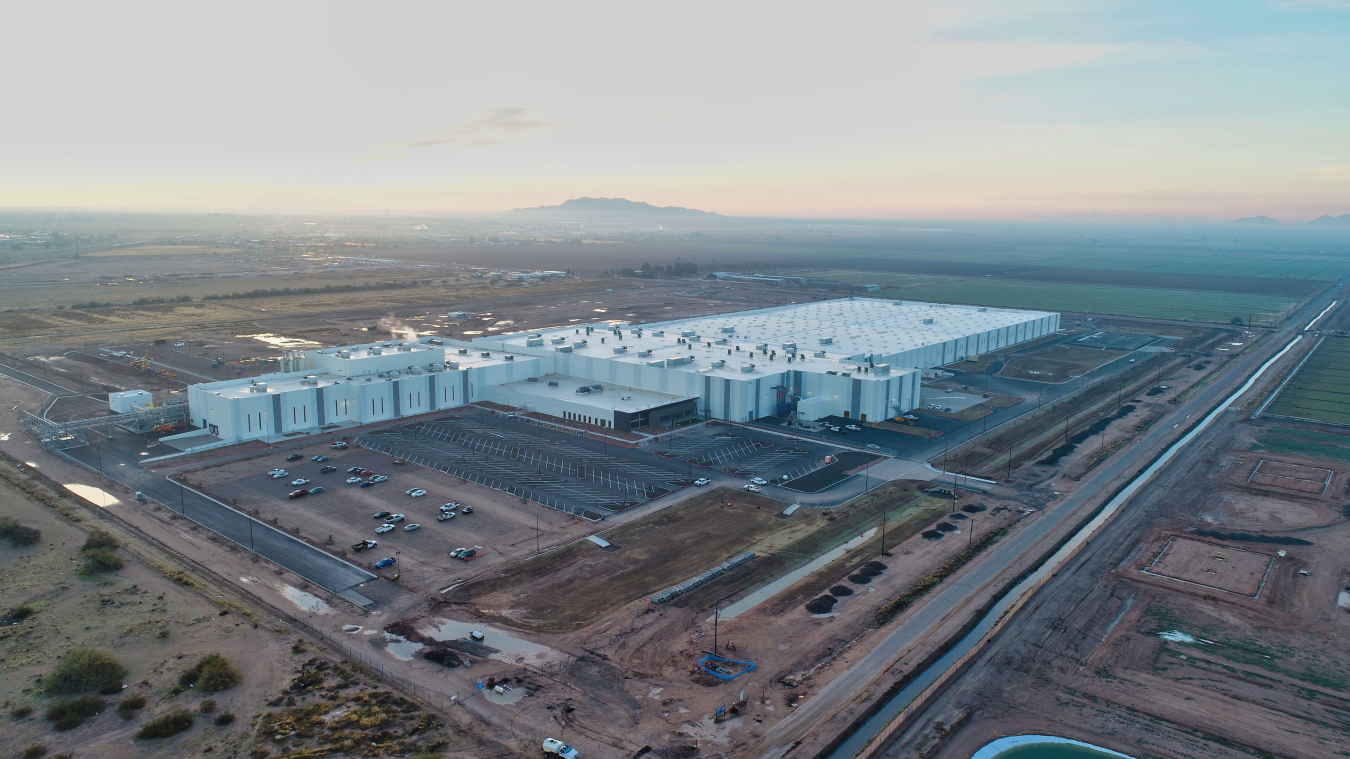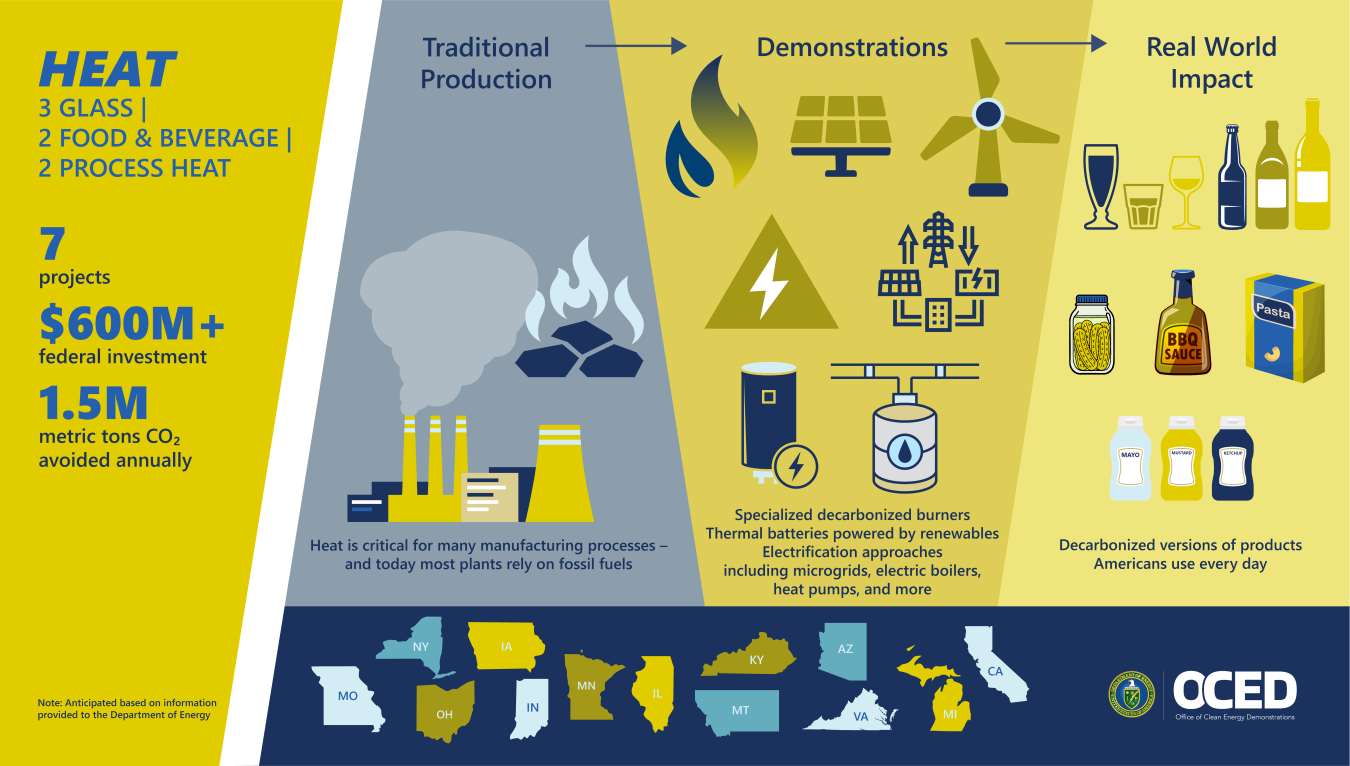
Back to main IDP Project Selections page >
Awarded Projects
Food and Beverage
Location: Currently considering Champaign, IL; Granite City, IL; Kendallville, IN; Mason City, IA; New Ulm, MN; Columbia, MO; Lowville, NY; Fremont, OH; Mason, OH; Garland, TX; and Winchester, VA
Federal Cost Share: Up to $170.9 million
Recipient: Kraft Heinz Foods Company
Project Summary
The Delicious Decarbonization Through Integrated Technologies: Electrification, Renewables, and Energy Storage project, led by Kraft Heinz Foods Company, plans to upgrade and decarbonize its process heat using sustainable technologies at up to 11 facilities by applying a range of technologies such as heat pumps, electric heaters, and electric boilers in combination with energy efficient and renewable technologies. The tailored application of these technologies is expected to reduce annual emissions by more than a combined 100,000 metric tons of carbon dioxide per year if implemented at the 11 sites. By demonstrating the integration of multiple decarbonization pathways, this project seeks to help a major American brand achieve deep decarbonization and serve as an example for other U.S. food and beverage companies to reduce emissions from process heat while reducing energy costs.
Location: Shelbyville, KY and Plainfield, IL
Federal Cost Share: Up to $75 million
Recipient: Diageo Americas Supply, Inc.
Project Summary
In the Heat Batteries for Deep Decarbonization of the Beverage Industry project, Diageo Americas Supply, Inc. (Diageo) plans to partner with Rondo Energy and the National Renewable Energy Laboratory to replace natural gas-fired heat with Rondo Heat Batteries, electric boilers, and other thermal solutions. These assets would be powered by onsite renewable energy at facilities in Shelbyville, KY and Plainfield, IL. These upgrades to beverage production facilities would reduce carbon emissions by nearly 14,000 metric tons per year. They would also provide a highly replicable blueprint that manufacturing companies could use to integrate thermal heat batteries with intermittent renewable energy into their facilities, while reliably and competitively delivering products to their consumers.
Glass
Location: Toledo, OH
Federal Cost Share: Up to $45.1 million
Recipient: Libbey Glass
Project Summary : The Flexible Fuel Electric Hybrid Glass Furnace Demonstration project, led by Libbey Glass, plans to replace four regenerative furnaces with two larger hybrid electric furnaces to reduce the carbon intensity of its Toledo, OH facility by up to 50%. The hybrid furnaces combine the benefits of oxygen fuel with electric melting, replacing up to 80% of the melting energy with electricity. The electrification of this process is expected to significantly reduce criteria air pollutants, including nitrogen oxides, sulfur oxide, and particulates, which would improve the air quality surrounding the facility. Because glass tableware such as drinking glasses have some of the highest glass product standards, this project could demonstrate the viability of electrification and alternative fuel use for the entire glass industry.
Location: Zanesville, OH
Federal Cost Share: Up to $56.6 million
Selectee: Owens-Brockway Glass Container, Inc.
Project Summary
The Glass Furnace Decarbonization Technology Stack Project, led by Owens-Brockway Glass Container, Inc. (O-I Glass), plans to rebuild one furnace at the O-I Glass facility in Zanesville, OH. This project aims to reduce carbon intensity by 20–40% compared to glass produced on a baseline furnace. This rebuild would combine five cutting-edge technologies on the furnace, marking the first time that all five technologies have been implemented simultaneously. These technologies, which include improved heat recovery and fuel systems, material pre-heating, and electric conversions, would reduce waste heat, energy demands, and both direct and indirect carbon dioxide emissions. The project could demonstrate the commercial feasibility and functionality of combining multiple decarbonizing technologies that could be replicated across different glass colors and container types.
Location: Modesto, CA
Federal Cost Share: Up to $75 million
Recipient: Gallo Glass Company
Project Summary
The Hybrid Electric Glass Furnace Project, led by the Gallo Glass Company (Gallo Glass), plans to install a demonstration hybrid electric furnace to reduce natural gas use by up to 70%, increase recycled content in its glass bottle production process, and demonstrate cradle-to-gate reductions in carbon intensity of more than 40% compared to traditional gas-powered furnaces. To maximize the project’s environmental benefits, Gallo Glass plans to leverage low-carbon energy sources where possible. Gallo Glass anticipates selling low-carbon glass bottles as a premium option, contributing to the decarbonization of a large portion of glass packaging for California’s wine and spirits industry.
The project expects to generate new, union jobs at Gallo Glass that will be represented by the United Steelworkers Union. Gallo Glass plans to partner with local educational institutions and workforce development organizations to develop plans to expand its existing training programs and integrate skills associated with the hybrid melting process as well as the latest glass manufacturing technologies. Additionally, the company intends to collaborate with local groups to support job skill development for local residents of diverse backgrounds in the community and aims to institute a Community Benefits Plan Advisory Committee comprised of labor organizations, community members, and industry professionals, and pursuing a Community Benefits Agreement.
Process Heat
Location: Medina, NY
Federal Cost Share: Up to $145 million
Recipient: Skyven Technologies
Project Summary
In the Steam-Generating Heat Pumps for Cross-Sector Deep Decarbonization project, Skyven Technologies (Skyven) plans to partner with manufacturing facilities across multiple manufacturing sectors in the United States, starting with the Western New York Energy (WNYE) facility in Medina, NY, to pioneer a process-heat-as-a-service model. This approach would electrify steam production to replace natural gas boilers to meet the needs of an energy-intensive facility that currently relies on fossil-fired heat. By developing this technology, Skyven would demonstrate expertise and economic viability of this technology solution that can be replicated among diverse heat-using manufacturers.
Project Name: Vikrell Electric Boiler & Microgrid System
Location: Casa Grande, AZ
Federal Cost Share: Up to $51.2 million
Recipient: Kohler Co.
Project Summary: The Vikrell Electric Boiler & Microgrid System project, led by Kohler, plans to upgrade its new Vikrell bath and shower fixture manufacturing facility in Casa Grande, AZ. The project plans to install electric boilers and a microgrid consisting of a 21 MW solar array and a 20.5 MW battery energy storage system to reduce carbon dioxide emissions by an estimated 7,865 metric tons per year, reducing at least 75% and up to 90% of the pressing process CO2 emissions from natural gas boilers on site. The project aims to demonstrate the viability of a renewables and microgrid system to decarbonize process heat emissions and demonstrate applicability to a wide range of manufacturing processes. The cutting-edge system intends to provide seamless switching between energy sources to optimize decarbonization and economics, eliminating carbon emissions from natural gas boilers for industrial process heating.
Once a project has been selected, both DOE and the selectee have the right to withdraw from the agreement negotiations. Selected projects under this program that are no longer moving forward in negotiations for federal funding: Unilever.


